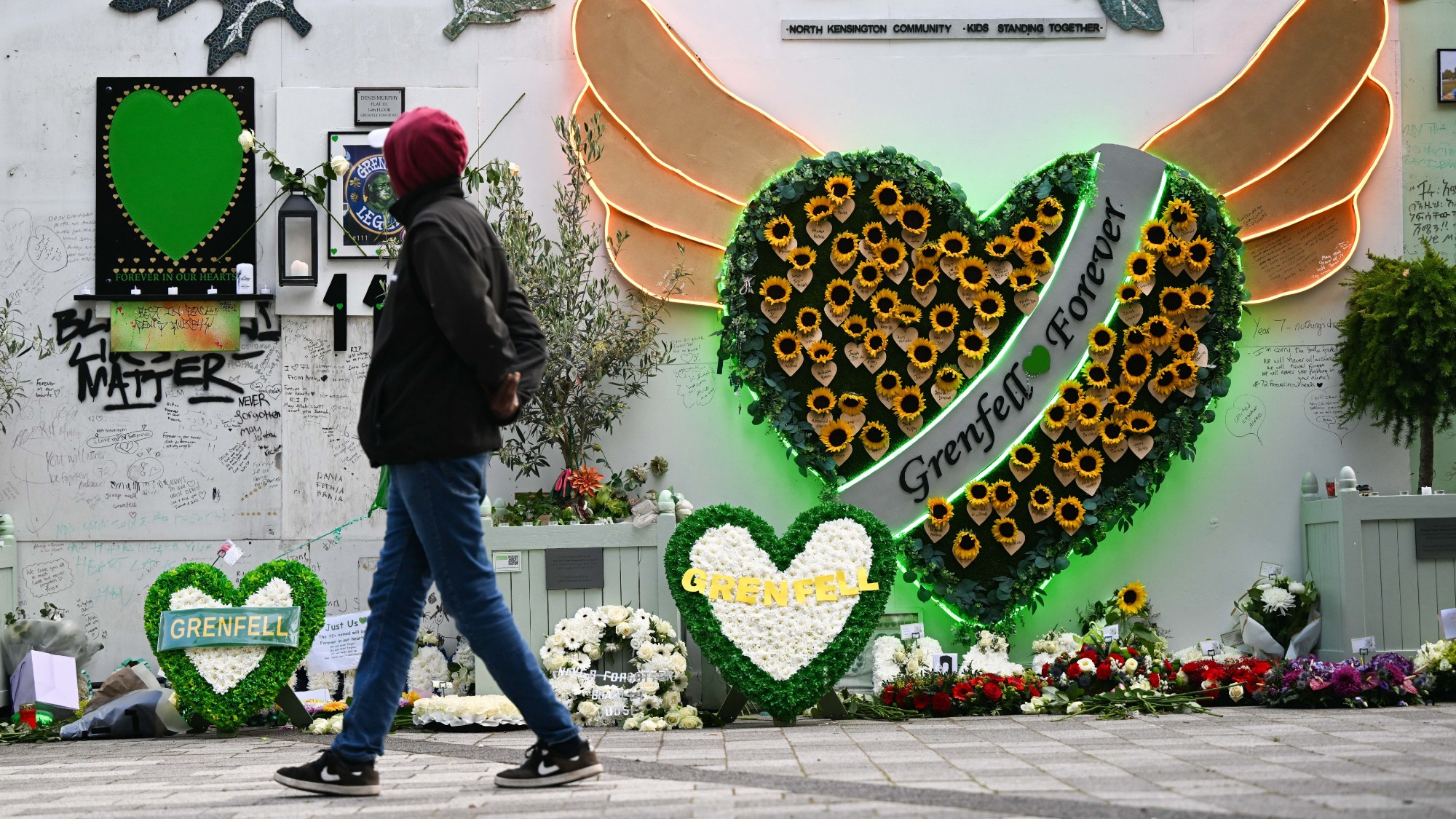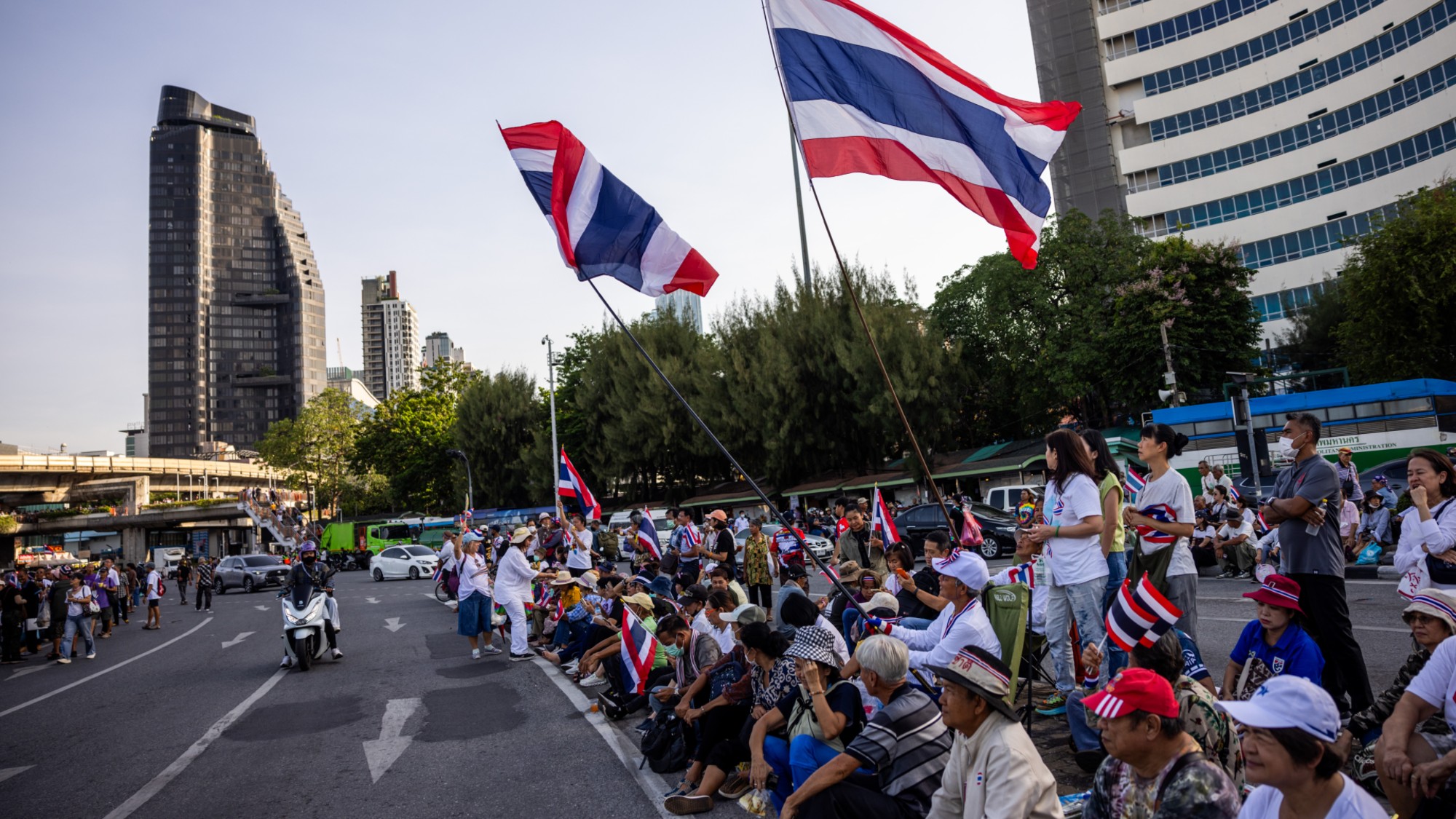Grenfell Tower and the dilemma of tragic landmarks
Plans to demolish fire-damaged tower exposes sensitivities over nature of remembrance

A free daily email with the biggest news stories of the day – and the best features from TheWeek.com
You are now subscribed
Your newsletter sign-up was successful
The burnt-out remains of Grenfell Tower will be "sensitively" dismantled, the government has confirmed, nearly eight years after fire gutted the 24-storey London tower block, killing 72 people.
The decision was triggered by expert advice that the tower is "significantly damaged", said the BBC. The government has already committed to create a "fitting and lasting memorial" that would be a "sacred space" for "remembering and reflecting", but just what form that memorial will take – and whether it should use material from the tower – remains a delicate question.
How have survivors and locals reacted?
"The overwhelming majority" of locals are in favour of demolishing the tower because they're concerned that the burnt-out structure is unsafe, Mushtaq Lasharie, chair of the Lancaster West Residents' Association, told the BBC. Taking the structure down would offer "closure", although a "small minority" were in favour of it remaining "to remind people" of the tragedy.
The Week
Escape your echo chamber. Get the facts behind the news, plus analysis from multiple perspectives.

Sign up for The Week's Free Newsletters
From our morning news briefing to a weekly Good News Newsletter, get the best of The Week delivered directly to your inbox.
From our morning news briefing to a weekly Good News Newsletter, get the best of The Week delivered directly to your inbox.
Among former Grenfell residents and their families, opinions are mostly against the plans. Dismantling the tower puts the tragedy "out of sight and out of mind" for those responsible, survivor Emma O'Connor told Radio 4's "Today" programme. She suggested that any unstable upper floors should be removed and then re-erected as a memorial.
But, while "of course it will be painful for survivors and neighbours" for the tower to come down, it is "toxic for a city to constantly contemplate its own tragic failures", said Edwin Heathcote in the Financial Times.
What will replace Grenfell Tower?
There is already a plan to erect a permanent memorial at the Grenfell site but, again, there are a range of feelings over what form this should take. Suggestions have included transforming the tower into a "vertical garden" with a high level platform and hanging plants. Others have suggested that the site could become a park, a garden space, a museum, or a brand new structure that would reach the same height as Grenfell.
The independent Grenfell Tower Memorial Commission, which is in charge of selecting the design of the memorial, has so far only said that the eventual memorial should include a garden, monument and space for mourning.
A free daily email with the biggest news stories of the day – and the best features from TheWeek.com
Five design teams have been shortlisted to create the memorial, with the aim of the successful bidder submitting a planning application late next year. What happens next will define how we remember the tragedy, said Emma Dent Coad, architectural historian and MP for Kensington at the time of the fire, in Intelligence for Architects. And what is "certain" is that "there will be anger, upset and more trauma for my friends and neighbours down the road".
What's happened at other tragic landmarks?
In Hiroshima, Japan, a building left standing after the atomic bomb exploded on 6 August 1945 has been preserved and turned into a memorial to the people who were killed. The Auschwitz concentration camp in Poland has also been preserved as a reminder of the horrors of the Holocaust.
Ground Zero, the site of the 9/11 attacks on the twin towers of the World Trade Center in the US, is now a commemorative space that includes several monuments that pay tribute to the victims and survivors.
Some disaster sites, such as the former Chernobyl nuclear plant, have attracted large visitor volumes as part of a morbid travel trend known as dark tourism.
Chas Newkey-Burden has been part of The Week Digital team for more than a decade and a journalist for 25 years, starting out on the irreverent football weekly 90 Minutes, before moving to lifestyle magazines Loaded and Attitude. He was a columnist for The Big Issue and landed a world exclusive with David Beckham that became the weekly magazine’s bestselling issue. He now writes regularly for The Guardian, The Telegraph, The Independent, Metro, FourFourTwo and the i new site. He is also the author of a number of non-fiction books.
-
 How the FCC’s ‘equal time’ rule works
How the FCC’s ‘equal time’ rule worksIn the Spotlight The law is at the heart of the Colbert-CBS conflict
-
 What is the endgame in the DHS shutdown?
What is the endgame in the DHS shutdown?Today’s Big Question Democrats want to rein in ICE’s immigration crackdown
-
 ‘Poor time management isn’t just an inconvenience’
‘Poor time management isn’t just an inconvenience’Instant Opinion Opinion, comment and editorials of the day
-
 ‘Human trafficking isn’t something that happens “somewhere else”’
‘Human trafficking isn’t something that happens “somewhere else”’Instant Opinion Opinion, comment and editorials of the day
-
 ‘Latinos bring a wealth of knowledge and cultural connection to the ocean’
‘Latinos bring a wealth of knowledge and cultural connection to the ocean’Instant Opinion Opinion, comment and editorials of the day
-
 Should the US resume nuclear testing?
Should the US resume nuclear testing?Talking Points Trump vows to restart testing, but China might benefit most
-
 Trump ends Asia trip with Xi meeting, nuke threat
Trump ends Asia trip with Xi meeting, nuke threatSpeed Read Trump had spent the last six days in Asia
-
 Kim Jong Un’s triumph: the rise and rise of North Korea’s dictator
Kim Jong Un’s triumph: the rise and rise of North Korea’s dictatorIn the Spotlight North Korean leader has strengthened ties with Russia and China, and recently revealed his ‘respected child’ to the world
-
 ‘Democracy is under threat globally’
‘Democracy is under threat globally’Instant Opinion Opinion, comment and editorials of the day
-
 'America is becoming a nation of homebodies'
'America is becoming a nation of homebodies'Instant Opinion Opinion, comment and editorials of the day
-
 Eighty years after Hiroshima: how close is nuclear conflict?
Eighty years after Hiroshima: how close is nuclear conflict?Today's Big Question Eight decades on from the first atomic bomb 'we have blundered into a new age of nuclear perils'